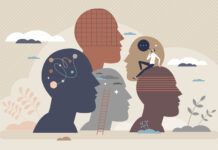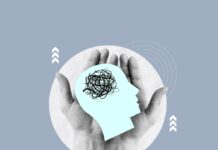In their article published in Society and Mental Health, Monique Botha and David M. Frost apply the minority stress model to an investigation of quality of life and mental health in a sample of adults self-identified as having Asperger syndrome (AS) or high-functioning autism (HFA). Individuals with AS and HFA are understood as “neuro-minorities” in the publication, and their experiences are examined through this socio-contextual framework.
“Increasingly, autistic people themselves are beginning to consider AS and HFA as forms of neurodiversity and a key part of their identities, as central as other social identities such as sexuality or race,” Botha, a doctoral student in psychology at the University of Surrey, and Frost, a social psychologist at the same university, write.

Consistent with patterns associated with the social stress and stigmatization across other minority groups identified in past research, the authors found a significant connection between everyday discrimination and the expectation of rejection among participants. Being “out” and open about one’s AS or HFA status was linked to lower psychological well-being, indicating that the consequences of autism-associated stigma may negatively impact an individual’s interpersonal experiences. Botha and Frost’s work challenges the notion that poor quality of life and autism are intrinsically related, and emphasizes distress associated with external factors and social stigma.
“In the present study we extended the minority stress model to examine the extent to which stigma-related stressors are associated with diminished well-being experienced by the HFA and AS population,” they write. “We hypothesized that there would be a relationship between minority stressors and poorer mental health outcomes, such that greater amounts of reported minority stress would be associated with poorer mental health and well-being.”
In recent years, some have challenged the perceived “medicalization of autism,” instead conceptualizing autism spectrum disorders as a “[fact] of culture rather than a fact of nature.” Because there isn’t a go-to, formal pharmacological intervention tied to autism, opposition to the label hasn’t had the same traction compared to something like attention-deficit/hyperactivity disorder (ADHD). However, autism is often framed as a “deficit” despite research indicating that characteristics of autism, particularly in individuals identified as having AS or HFA, belongs on the same plane as behaviors widely considered normal.
Others have argued that autism would be more appropriately considered a “hypersensitivity” than “deficit.” Additional controversy exists as to whether or not autism constitutes any one underlying “disorder” given the breadth of the spectrum within the autism umbrella.
“The minority model of disability is underpinned by the notion that one can have a condition the medical model considers a disability, but in actuality, it is a society with restrictive notions of normal that creates disability,” Botha and Frost write.
In laying the groundwork for their investigation, the authors highlight that autism among adults gets limited attention in research and that less than one percent of funding for autism-associated research in the United States and the United Kingdom is devoted to understanding the social factors contributing to psychological distress experienced by those with autism. They cite one study that found that 9 of the top ten words used to describe characteristics of AS were negative.
Botha and Frost assert that stigmatization begins with the process of labeling. Then, “labels absorb the meaning society gives them, and […] assigning value-based meanings to labels can often perpetuate stigma.” Most adults with autism are conscious of differences between themselves and others without the label. Social rejection, victimization, workplace discrimination, and a number of other challenging quality-of-life associated hurdles have been linked to autism. Although past research has examined social “deficits” tied to autism, the effects of stigma have been understudied.
The minority stress model emphasizes that minority groups have been deemed less valuable on the basis of social norms and that “disability” is the product of societal rigidity rather than within-individual deficits. It has been most frequently applied in the examination of health disparities across a range of minority groups.
Health disparities and higher rates of psychological distress linked to autism prompted researchers to examine stress, mental health, and well-being in relation to social factors, and to determine the extent to which distress and health outcomes could be linked to social circumstances after controlling for other known contributing factors.
Results were based on responses to an online survey from a sample of male and female adults (N = 111) self-identified as having AS or HFA. Questions addressed demographic information, general stressful life events, victimization and discrimination events, everyday discrimination, an expectation of rejection, outness, physical concealment, internalized stigma, well-being, and psychological distress.
Consistent with hypothesized outcomes, Botha and Frost linked increased stress associated with minority status to unfavorable health and quality of life factors. Additionally, while “outness” is associated with positive psychological outcomes for sexual minority groups, the opposite was found to be the case for individuals in this sample of individuals with AS and HFA. In essence, external factors associated with the stigma associated with autism may have detrimental effects on those with AS and HFA.
“In light of the results, the findings of this study, if upheld in further research, could mark a change in the way we consider mental health and well-being in the autistic community,” the authors conclude. “This reframing of perspectives on autism can reflect a movement in which mental health problems such as depression, anxiety, and suicidal ideation are no longer considered inherent to autism.”
This small study only begins to paint a picture of the impact of external social variables on the experiences of those with AS and HFA but hints at compelling possibilities for the future of autism research.
****
Botha, M., & Frost, D. M. (2018). Extending the Minority Stress Model to Understand Mental Health Problems Experienced by the Autistic Population. Society and Mental Health. (Link)















Seems that many people in the autistic community don’t care for “autism speaks” http://www.google.com/search?q=boycott+autism+speaks
Report comment
Looks even nastier than NAMI. The commercial is sickening!
Some demonic voice boasts about ruining the parents’ lives and destroying the family. The parents and a bunch of other folks claim they will conquer It.
The autistic member never appears. This creepy ad makes the viewer assume the “defective” member is Damien from The Omen who needs to be conquered somehow. By the Normal members banding together they can banish the demonic autistic to the Realms of Outer Darkness from whence he/she came. ICK!!!
Report comment
Autism is a myth, just like every other so-called “mental illness.” The book to read on this topic is Edith Sheffer’s “Asperger’s Children.” Read it. You’ll never think of “Autism” in the same way again.
https://www.amazon.com/Aspergers-Children-Origins-Autism-Vienna/dp/0393609642
Report comment
Researchers claim Autism is in the infant brain. https://www.mcgill.ca/neuro/channels/news/pinpointing-origins-autism-269888
Though they could be fudging the numbers, like they do in other “science” when they cherry pick numbers, or influence the outcome by removing unwanted material.
Report comment
Sorry, “Slaying Dragon”, but I must disagree with your statement that “Autism is a myth, just like every other so-called “mental illness””. Given that I regularly describe psychiatry as the pseudoscience which it is, and that the DSM is a catalog of billing codes, I’m sure you’ll see what I am NOT disagreeing with! Much of my limited knowledge of “autism” comes from the website “Age of Autism”, which is kind of a lower-budget Mad in America”. Their content is produced mostly by parents of severely autistic children, and they include lots of links to other sources of information. There’s a “something there” as regards autism, in a way that there just isn’t with so-called “mental illness” in general. And, the numbers of parents of children with so-called “regressive autism”, who were completely “normal” until right after they got vaxxed, is much, much higher than the lame-strem mass media will ever acknowledge. It seems that in SOME vulnerable persons, vaccines trigger a type of auto-immune respons which leads to an encephalopathy which gets diagnosed as “autism”. And the degree of impairment in autistic children is extreme enough that I’d say, yes, AUTISM IS REAL.
What I find most telling, is that the “Medical-Industrial-PhRMA-Research-Complex” is not at all interested in even discussing possible “environmental” causes of autism, or discussing possible causes at all, except a so-far fruitless search for “autism genes”.
That so-called “Asperger’s” no longer exists, having been folded into ASD in the DSM-5, supports what I’m saying here. There *IS* a “something” in far too many children, and the label in use is “autism”.
Personally, I think so-called “Aspergers” is bogus, but not autism. So I look forward to reading more at the link you provided. I’m sorry it’s taken so long for my comment to appear…. I think this is the first time I’ve ever disagreed with ANYTHING you usually write!
(Dragons are powerful mythical creatures, and comparing them to quack psychiatrists is insulting to dragons, but that’s just my personal opinion. SLAY AWAY, & how can I help you do that?!…. 😉
Report comment
What about people who can’t talk or do other things we take for granted? I’m not ruling out what you say Dragon Slayer, but I find it confusing.
Report comment
Autism is when your ego is beyond apollonian state of psyche. You do not belong to rational reality, then. You are beyond rationalism and beyond theologic or spiritual concepts of psyche. We have a homo economicus today, but there will be homo psychologicus in the future.
These kids are the highest form of humans, highly psychological, beyond the system of signs so they are beyond the language. They are unique, that is why I am for psychological socialism.
Because there is a hierarchy in the psyche and autistics are the highest form of psychological man and apollonians are in the easiest archetype. They must learn to serve.
This is psyche.
Apollonians may fall to the same pit they have dig out for psychological people. Just wait.
James Hillman – Re visoning psychology. Without that book, you know nothing about the REAL psyche. Fake psychiatric empiricism is like authoritarian crud.
Report comment
A lot of that “stigma” could easily be avoided if people would just STOP “self-identifying” as “autistic”, or “Aspergers”…..
Report comment
When does a person become “autistic”, on a spectrum https://www.ted.com/talks/temple_grandin_the_world_needs_all_kinds_of_minds
Report comment
I might be able to. But I prefer to overcompensate by observing/analyzing social cues and behaving as normally as I can.
People shouldn’t be mean and nasty. But they are. They get no fodder from me!
Report comment